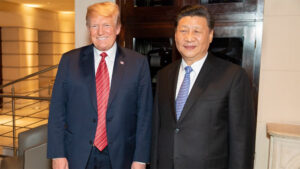Prime Minister Modi is stateside and prepping for his address to Congress and state dinner. While a summit with Modi may have been inevitable (as he’s the leader of the most populous country and up-and-coming power), we need to look at India’s relationship with the rest of the world to see what might come of this meeting.
Given India’s fractious decision-making system – with most decisions occurring at the state and local levels – operating as a “country” is out of the question. India is only interested in things that impact India, so relationships and allies won’t work. The Soviets established ties back in the day, but that relationship is functionally over.
India has other factors that have inhibited its ability to form strategic relationships (or contributed to its ability to remain independent). Geographic barriers have helped keep others out, but also prevent India from projecting power. India is near the Persian Gulf, so they don’t need to worry about an energy crisis. They have decent demographics and plenty of time before any problems would arise. The collapse of China will send India into an industrial boom where they will be able to manage everything in-house.
All of these factors have enabled India to become a globally significant economy without being globally wired. Now the question remains…do I see anything meaningful coming out of this meeting? No, but a conversation about the future is better than nothing.
Prefer to read the transcript of the video? Click here
Here at Zeihan On Geopolitics we select a single charity to sponsor. We have two criteria:
First, we look across the world and use our skill sets to identify where the needs are most acute. Second, we look for an institution with preexisting networks for both materials gathering and aid distribution. That way we know every cent of our donation is not simply going directly to where help is needed most, but our donations serve as a force multiplier for a system already in existence. Then we give what we can.
Today, our chosen charity is a group called Medshare, which provides emergency medical services to communities in need, with a very heavy emphasis on locations facing acute crises. Medshare operates right in the thick of it. Until future notice, every cent we earn from every book we sell in every format through every retailer is going to Medshare’s Ukraine fund.
And then there’s you.
Our newsletters and videologues are not only free, they will always be free. We also will never share your contact information with anyone. All we ask is that if you find one of our releases in any way useful, that you make a donation to Medshare. Over one third of Ukraine’s pre-war population has either been forced from their homes, kidnapped and shipped to Russia, or is trying to survive in occupied lands. This is our way to help who we can. Please, join us.
CLICK HERE TO SUPPORT MEDSHARE’S UKRAINE FUND
CLICK HERE TO SUPPORT MEDSHARE’S EFFORTS GLOBALLY
TRANSCIPT
Hey everybody. Peter Zeihan here. Iit is the 21st of June. Well, here’s Loki. Today we’re talking about India. Look, he’s from India. Bengal. Anyway, Prime Minister Modi is in Washington right now. And by the time you see this on Thursday, he’ll be getting ready for his address to Congress as well as official state dinner.
There was some debate in Biden world about whether this is going to happen because in the past, Prime Minister Modi, especially before he was prime minister, hasn’t been a particularly nice guy. A little on the corrupt side, a lot of the popular side is willing to use religious divisions in order to further his political agenda, which is, you know, relatively distasteful from the American point of view and a lot of other points of view. Many would argue the Indian point of view anyway. He is still the leader of the most populous country in the world and an up and coming power.
So obviously there was going to be a summit. The question whether he would be welcomed as warmly as he has. A few things we need to talk about India, the Indians and the relationship with the wider world and the United States in particular. First and most obviously, the Biden administration has a few things that it wants from the Indian administration, that it would like more cooperation on things like the Ukraine war and sanctioning Russia.
They would like more cooperation on things like tech sanctions and in general, the diplomatic isolation of China. And the Biden administration is going to get none of that. The key thing to remember about India is that India looks out for India’s own best interests. And while every country does that to some degree, the big difference between India and everyone else is that India is not really a country.
It’s more like the Holy Roman Empire, where there is technically a central government, but almost all decisions that matter are made at the state and local level. And so while Modi is nominally the leader of this, and that does give him significant power and influence, he is only the most powerful of several dozen personalities across the Indian system who have decision making power.
And so the capacity of India to act like a state in the way that we think of that with France and China and Japan and the United States and the rest is very, very weak. Second, because of this internal, fractious, ever shifting coalition in competition, India, first and foremost concerned about how do things in the world impact India and makes it very, very difficult for the Indians to identify with any other power in terms of friendship or family or alliance or in sometimes even partnership.
So unless they see someone on the outside that is backing them and to the hilt for absolutely every little thing they care about, they’re going to call the relationship at best complicated and cold. It’s a very myopic way of looking at the world. But India has a very peculiar geography. It’s basically locked off from the rest of the world by a series of geographic and geopolitical barriers.
There are mountains and deserts and oceans and jungles and jungle, mountain and jungle deserts that general deserts. Sorry, desert mountains that separated them from everyone. And that’s not even all of it, because in a lot of these border territories, you’ve got hostile powers, whether it’s Pakistan, Bangladesh, Myanmar or, of course, China. So the ability of India to interact with the rest of the world has always been circumscribed.
And unless you are willing to back India on everything that involves their immediate neighborhood, without question, they’re going to view you with a bit of suspicion. This is one of the reasons why the Soviets during the Cold War were able to make India into a bit of a partner because they had no interests in Southeast Asia. So they just backed who ever happened to be the biggest power India, against everyone else.
And so the Indians developed a bit of a shine on all things Moscow, which has persisted long after the communist system has ended. What this means for the United States is India cannot ever be family. It can never be an ally, it can never be a friend, but it can be a partner from time to time. But because the Indians view everything through the very short sighted lens of national interest, they don’t have anyone who will watch their back.
The Russians have proven they’re not a reliable partner and the Indians are backing away from their defense cooperation with them, because the Indians now realize that the money that they’ve spent has been wasted, that the Russians can’t maintain their own output. They’re actually asking for some of the components back in order to support the war in Ukraine and at the high end works like the Brahmos cruise missile.
That’s just not going to happen at all. And so the Indians, you know, they’re not dumb. They’re short sighted. There’s a difference. And eventually you get to a certain point where they realize now they would only be putting good money after bad. And that means the Russian partnership, if that’s the right term, is now functionally over as well.
India is also not going to help the United States in boxing in the Chinese because they have a hard time seeing past their own nose. And anything that reeks of American leadership, which, you know, obviously would be in play here is something the Indians are going to reflexively recoil against. Now, does this mean that I think India is doomed?
No. Far from it. A couple of big things to keep in mind. Number one, geography works both ways. India has a hard time projecting out other powers, have a hard time projecting in, especially on land for naval powers like the United States and Japan. That’s less true. And that’s one of the reasons why this quad idea exists, because Japan, Australia, the United States and India can cooperate to a degree on naval issues that affect the Indian Ocean Basin because Japan, Australia, the United States don’t have strong interests in the Indian Ocean Basin, especially now that the war on terror has been closed down.
There was a period for the last 20 years where Indian American relations were not hostile but problematic because the United States had to be up to its hips in all things Pakistan in order to get military supplies to its operation in Afghanistan. Now that that’s over, the Indians and the Americans can commiserate about how much they dislike all things Pakistani, and that’s done wonders for their relationship.
Second, India is the first major country after you leave the Persian Gulf, which means that no matter what happens with global commerce or global energy, India is the first in line and it will never really have an energy crisis compared to what’s shaping up for the rest of the world. That’s amazing. Third, India’s demographic structure, while not perfect, is night and day different from the country they love to compare themselves to?
And that is China. New data out of China in just the last few weeks indicates the demographic profiles of Harvard. Worse than even I thought. The Chinese are now publicly admitting they have about half as many five year olds as ten year olds. So you carry that forward with some of the other problems that dividing reified with their own demographic strategy.
And it looks like whatever I was thinking was going to happen, which was already pretty atrocious, may have already happened. And we’re looking at a complete hollowing out. Now, India started to industrialize in a big way 35 years ago, and so the birth rate has dropped. But at current rates of birth rate decline, India will not find itself in a Chinese style situation for another 60 to 70 years, and that’s a long time for things to go right.
So India does have a demographic dividend to go along. A young adults that had fewer children in the past, that generally spells an opportunity for a 20 to a 30 year consumption driven growth opportunity. That’s not without risk. But on the mechanics of it, the next couple of decades look great. And then the fourth, as the Chinese face problems, a lot of the manufactured goods that the world has been importing from the Chinese system are going to go away.
Now, that means if countries still want stuff, they to have to build out their own networks to build that stuff themselves. If that applies to India just as much as everywhere else. So we should expect to see a 2 to 3 decade industrial boom in the Indian space as well. Now it will be different from what’s happening in Mexico because remember India has no allies, no friends and very few partners, and those partners are erratic.
So the sort of manufacturing synergies that Canada, the United States and Mexico and to a lesser degree Central American Columbia can generate. India has to do it all itself. And that means it’ll be more expensive, more time consuming and slower to happen and use more labor, be less productive, less efficient at the end of the day, have lower quality product.
But in a fractured world, India will have something that a lot of countries won’t. It’ll still have stuff. And in that sort of world, India looks good. They are perfectly capable, the Indians, of running an economy that is globally significant without being one that is globally wired. So for Biden, do I think anything of substance is going to come out of this summit?
No. The geography of India, the politics of India, the ideology in India probably precludes that. But that doesn’t mean that the relationship has to be hostile. And if there’s going to be a major power in a different hemisphere, in a strategically interesting area, you should at least have a conversation. And so think of that as what’s going on with the Biden administration right now.
Not a plan for the future, a conversation about it. We could do a lot worse. All right. That’s it. Take care.








